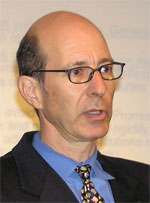Abstract. This note responds to Arne Heise’s critque of my article on Keynes’s denial of conflict in The General Theory. Heise’s response fails to show Keynes addressed conflict and makes several meritless criticisms regarding my treatment of Keynes and Keynesianism. It also fails to recognize the purpose of my article which was to show conflict […]
Read More »Rethinking conflict inflation: the hybrid Keynesian – NAIRU character of the conflict Phillips curve
This paper presents a new formulation of conflict inflation labeled the “pass-through” approach, which contrasts with the existing “pressure balance” approach. The model generates Phillips styled inflation – unemployment dynamics that are a hybrid of Keynesian and NAIRU dynamics. Conflict inflation arises when economic activity rises above the consistent claims activity level, and it is […]
Read More »Europe’s foreign policy has been hacked and the consequences are dire
Europe’s foreign policy has been hacked and captured by US Neocon interests. That capture poses a dire threat to both European democracy and global security. The threat to global security is because Europe is now captive in the US Neocon war on China and Russia. The threat to democracy comes from European voters gradually intuiting […]
Read More »Israel’s genocide, US assistance, and consequences thereof
South Africa has now presented its charge of Israeli genocide in the International Court of Justice (ICJ), and Israel has presented its rebuttal. Regardless of the ultimate judgment, a page has been turned. Israel’s actions in Gaza, assisted by the US, have changed the geopolitical landscape. The consequences stand to be dire and lasting. The […]
Read More »The corruption of US foreign policy & weaponization of antisemitism
Below are three brilliant articles and one interview that help understand geopolitics at the beginning of 2024. In my view, they should be read by anyone interested in the geopolitical situation & should be required reading for students of international relations and international political economy: US Foreign Policy is a Scam Built on Corruption, Jeffrey […]
Read More »The theory of monetary disorder: debt finance, existing assets, and the consequences of prolonged monetized budget deficits and ultra-easy monetary policy
This paper introduces the notion of monetary disorder. The underlying theory rests on a twin circuits view of the macro economy. The idea of monetary disorder has relevance for understanding the experience and consequences of the recent decade-long period of monetized large budget deficits and ultra-easy monetary policy. Current policy rests on Keynesian logic whereby […]
Read More »The menace of the myth of General Pinochet’s Chilean economic miracle
September 11, 2023, marks the fiftieth anniversary of General Pinochet’s military coup against Chilean President Salvador Allende. While it is now widely recognized that Pinochet authorized large-scale human rights abuses, there is an accompanying narrative that he also unleashed an economic miracle via embrace of Milton Friedman’s “Chicago Boys” vision of a market economy. The […]
Read More »Broadening the application of hysteresis in economics: institutions, policy lock-in, psychology, identity, and ideas
This paper argues for broadening the application of hysteresis to institutions, policy lock-in, psychology, identity, and economic ideas. Hysteresis is an element of historical processes, and the real world is historical. That explains why hysteresis is pervasive and important. Hysteresis should be a fundamental building block of political economy. Expanding its application in economics is […]
Read More »Ukraine destroyed the Kakhovka dam: a forensic assessment
The Kakhovka dam was a massive two-mile-long structure that dammed the Dnieper River which bisects Ukraine. It was built by the Soviet Union in 1956 and raised the Dnieper by 16 meters (52 feet), creating the Kakhovka Reservoir. The dam was destroyed on 6 June 2023, resulting in massive flooding downstream on both sides of […]
Read More »The forgotten case against Milton Friedman: an interview about inflation and the Phillips curve
Milton Friedman revolutionized macroeconomics with his 1967 presidential speech to the American Economics Association (AEA), which presented a theory of the so-called natural rate of unemployment for the first time. That speech, which played a major role in discrediting the brand of Keynesianism that prevailed in postwar liberal economic policy thinking, remains one of the […]
Read More » Thomas Palley: Economics for Democratic and Open Societies
Thomas Palley: Economics for Democratic and Open Societies
